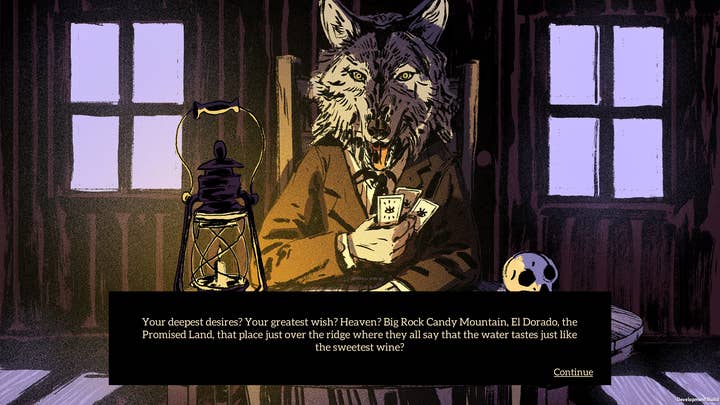Good Shepherd eyes growth through "bigger investments with bigger titles"
Paul Hanraets on the indie publisher's plans to move into 'triple-I' games, and partnering successful indie developers with "movie IP"
The team behind Good Shepherd may see themselves as custodians for developers making their way through the games industry, but the truth is that they are still on a journey of their own.
The company started as Gambitious, after all, but changed its name and its broad direction in August last year. Now, the story of Good Shepherd is poised to take another turn, with new investment allowing it to expand into the emerging triple-A indie market - or triple-I, or AA, pick your poison - and work with popular movie IP.
"I think this has to do with the shift - and you guys already wrote about it - where we changed our name from Gambitious to Good Shepherd, and we fully transitioned into being a publisher," says Paul Hanraets, director of corporate development, when we meet at the BIG Festival in Sao Paulo. "People still remembered us as this crowdfunding platform, and we really needed to shift our focus. We got a new investor on board at that time, so it was a good moment for the change."
"We've signed a title that's close to $3 million [budget]... So we're definitely moving up"
In the year since then, Good Shepherd has been laying the groundwork to scale up its business. It has new investors onboard, Hanraets says, including an unspecified number of Chinese partners, who joined at the start of the year. At the same time, former PlayStation producer Ben Andac - who joined the company when it rebranded as Good Shepherd - has been shaping and refining its portfolio strategy.
"Part of that strategy is to focus more on high-concept titles," Hanraets adds. "Not on specific genres, but over all genres. They have to bring something high-concept, something unique."
This aspect of the company's product strategy has been there since the day it adopted its new name. It is one of three "categories" Hanraets describes to me - "differentiation" in this case" - which all Good Shepherd games can be classified under to a greater or lesser extent. What has changed is the budget level that the company is now able to meet. Many of the titles it is signing now, Hanraets says, would fit into the "triple-I" or "triple A indie" category that has sparked so much interest.

"Our sweet spot is $600k funding per title, but now we're moving up to above $1 million, and we've signed a title that's close to $3 million... So we're definitely moving up.
"At the moment, we're funding titles from the corporation, the investment we make as Good Shepherd. Then we've got our group of individual investors - that hasn't changed. But we've also got more institutional investors now, bigger investors that invest in our slate... So it's a mix with those new investors that allows us to make bigger investments with bigger titles."
This investment in bigger games won't lead to a busier release slate, though. Indeed, Hanraets believes the opposite will be true. "I think we will sign fewer titles," he says. "Since Ben [Andac] started curating our portfolio we have been signing fewer titles. They're not making it through our greenlight process. We're stricter at the gate."
Hanraets stresses that the move into triple-I will be additive to what Good Shepherd currently does, resulting in a portfolio that mixes smaller and larger projects. Supporting and funding games like Where the Water Tastes Like Wine, for example, is a point of pride for the company, even when the sales don't quite meet expectations.
"We don't have a perfect answer where we can stick a number on the amount of triple-I games, the amount of more artistic games"
"Unfortunately, it wasn't the commercial success that we thought it would be, but on the quality level - the writing, the art style, the music - it hits all of our criteria," he says.
The game's developer, Dim Bulb, was less philosophical. Johnneman Nordhagen, who left Gone Home developer The Fullbright Company to found Dim Bulb, published a painfully honest and pessimistic blog post in which he concluded that the degree of effort and polish applied to "an experimental, ambitious" game like Where the Water Tastes Like Wine may no longer be sustainable. "Basically," Nordhagen wrote. "I'm not sure that games like this one can continue to be made in the current market."
"Of course we read that," Hanraets says. "What he said was really honest, but I think one of the lessons he took from that as a developer was that he skipped on player testing. We focused maybe a little bit too much on the artistic qualities of that title.
"I still believe that there is absolutely a market for the narrative-driven game, but they should embrace the gameplay mechanics as well... I think that's the mistake Johnneman made on Where the Water Tastes Like Wine; focusing a little too much on the artistic experience, and less on the actual gameplay."

Another of Good Shepherd's three categories is "Sustainability and Well-being", which encompasses games that explore mental health, social awareness and diversity. Hellblade is a good example of this in the triple-A market the company is poised to enter, but smaller games like Where the Water Tastes Like Wine are perhaps better placed to satisfy this aspect of Good Shepherd's portfolio strategy. Indeed, Hanraets says it is considering a similar game to Dim Bulb's title right now.
"It's part of our portfolio, but we need to balance it out," he says. "This is where I like our strategy at the moment... Finding those diamonds in the rough, the more artistic games that touch upon topics like that. There's definitely room for it.
"Of course, there needs to be commercial viability, there needs to be a good game, and we're playtesting them... We don't have a perfect answer where we can stick a number on the amount of triple-I games, the amount of more artistic games. This is where Ben Andac comes in; he's helping us to find that right balance."
"First we have to prove that the [movie IP] model works with Mike Bithell, but I'm so confident after seeing what he's doing with it"
But there is another new area that Good Shepherd intends to explore, which crosses over with its triple-I ambitions. According to Hanraets, the company has access to "some really nice IP, movie IP", which it will pair with experienced indie developers with the right pitches.
"We think that's a good combination," he says. "We are building relationships with the license holders, with the studios, and it's up to us to find the right developer with the right IP. It needs to be a good match."
Good Shepherd isn't ready to reveal actually which or how many IPs it has secured, or how many, but Hanraets can reveal that Mike Bithell, the creator of Thomas Was Alone and Subsurface Circular, will be the first developer to work on a game under this new initiative.
"I do think it fits our strategy," Hanraets says. "We're not releasing games quickly, out of a factory. No, we're pairing really good indie developers with this IP. We have high expectations.
"There are a lot of known developers in the industry that are pitching to us, who would love to work with IP. First we have to prove that the model works with Mike Bithell, but I'm so confident after seeing what he's doing with it."
The question of what "it" will be is a tantalising one, and Hanraets says that Good Shepherd will have more to say on that later this year. What's clear, though, is that the company intends for the deal with Mike Bithell to be the first of many in which prominent indies will be able to work with major movie IP - with Good Shepherd as connector and curator.
Along with triple-I games, this satisfies the third and final of Good Shepherd's product categories: growth, and in that respect Hanraets' goals are plain to see.
"Where we will be in a couple of years is hard to predict," he says. "We'll shift with the market, but we'll be a different company than we appear now. A much bigger publisher as well."








